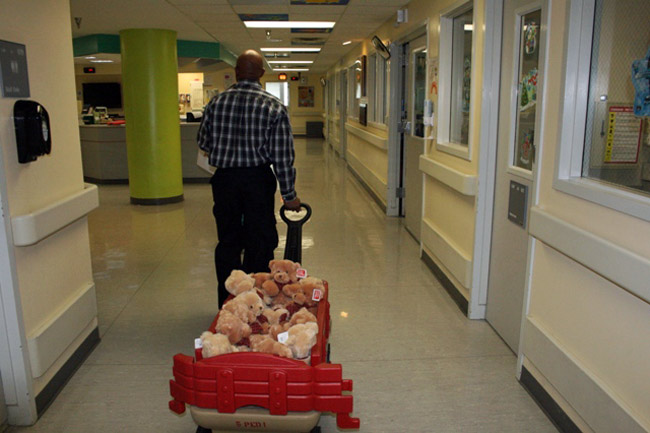
HOUSTON – Last year, Luis Duran drove almost 200 miles to San Antonio to have a colonoscopy because he didn’t want to wait six months for an opening at a county clinic.
A few days later, the doctor in San Antonio – a friend of a friend who had performed the screening for free – called to break the news that Duran, 51, had advanced colon cancer and needed immediate surgery.
“I kind of broke down,” recalled Duran, a machine operator whose employer had terminated his health policy. “I said, ‘Doctor, I don’t have insurance, and I don’t have much money, but I won’t refuse to pay. Please help me.'”
They say everything is bigger in Texas, and the problem of the uninsured is no exception. The Houston metropolitan area has one of the highest rates of uninsured people in America, and a health safety net imploding under the demands of too many people and too few resources. Almost one in three residents – more than a million people — lack health insurance, and about 400 are turned away every day from the county hospital district’s call center because they can’t be accommodated at any of its 23 community or school-based centers.
Those seeking care at the public hospital’s ER, meanwhile, arrive with blankets and coolers full of sandwiches and drinks in anticipation of waits that may go 24 hours or longer.
“If the Affordable Care Act is overturned, the rest of the country should take a good look at the situation in Texas, because this is what happens when you keep Medicaid enrollment as low as possible and don’t undertake insurance reforms,” said Elena M. Marks, a health policy scholar at Rice University’s James Baker Institute for Public Policy and a former city health official.
Opponents of the federal health care law see the problem of the uninsured very differently. They object not just to the price tag of expanding coverage to millions more people, but to the whole philosophy behind it.
Texans are individualistic and value their freedoms and responsibilities, said Lucy Nashed, spokeswoman for Gov. Rick Perry, who notes Medicaid spending is a big part of Texas’ budget.
“Individual responsibility is about making healthy choices and taking ownership of your lifestyle — not just about buying health insurance,” Nashed said. “And you can’t legislate a healthy lifestyle.”
Many Uninsured Have Jobs
With its fiscally conservative philosophy and cash-strapped state budget, Texas does not offer Medicaid coverage to childless adults unless they are pregnant, disabled or elderly. Parents of children covered by welfare are eligible for the state-federal health program only if they make no more than $188 a month for a family of three.
At the same time, the proportion of Texas workers with employer-sponsored insurance is almost 10 percentage points lower than the national average of 61 percent, in part because of the state’s high concentration of jobs in the agricultural and service sectors, which often lack benefits.
“Seventy percent of the people we see here are employed,” said Dr. G. Bobby Kapur, associate chief of the emergency room at Ben Taub General Hospital, part of the taxpayer-supported Harris County Hospital District.
“They’re hourly wage earners, nannies, [people] working in lawn care services or dry cleaning or real estate, or people working two part-time jobs and neither will pay for health care,” he said. “Many are small business owners who are well-educated and well-dressed.”
The problem is not too few health care providers –– although there may be a shortage of primary care doctors willing to treat Medicaid patients. Houston’s hospitals are world-renowned, drawing patients from all over the globe for its highly specialized care — primarily to those who can pay.
But the hundreds of thousands who work for small businesses, tend the city’s lawns, cook its food and care for its children often lack a regular source of primary care.
Overburdened Safety Net
Add in the unemployed and undocumented immigrants, and more than a million people depend on Houston’s safety net providers for their care.
“The number of uninsured in the city is four times the 300,000 patients they serve,” Marks said. “They can’t possible meet the demand for services, no matter how efficient they are.”
The publicly supported Harris County Hospital District schedules 1.5 million outpatient visits every year, and is building primary care clinics “as fast as we can,” to alleviate the crush in emergency rooms, said President and CEO David Lopez.
But sick patients are often scheduled for appointments two months after they call. Sometimes, as in Duran’s case, they must wait much longer.
“I called, but they said the first appointment I could get was August 14,” said Humberto Vasquez, 36, who recently joined a stream of patients heading to Ben Taub General Hospital’s ER.
Vasquez said he was worried about pain in his lower abdomen and back that had lasted for two weeks, wasn’t responding to over-the-counter painkillers and seemed to be getting worse.
As he walked into the emergency room, Benjamin Vasquez (no relation) was leaving, his left arm set in a cast and $100 poorer. Benjamin, a part-time bakery chef and Bible college student, had broken his arm playing soccer Monday evening and spent 24 hours in the ER; he was still wearing his red Number 12 soccer jersey and shorts.
It was his second time there; he had his appendix removed there nine years ago, gradually paying off a reduced fee of several thousand dollars, he said.
Duran, the cancer patient, was leaving after an outpatient chemotherapy treatment that cost $8, a subsidized rate. A year ago, when he was told there would be a six- month wait for a colonoscopy, his daughter, who works in a physician’s office in San Antonio, asked her boss if he knew someone who could do the screening for free.
He found someone, and after that doctor diagnosed cancer, rallied a team of surgeons to operate. Duran paid only the anesthesiologist and a negotiated hospital fee.
“If I had waited six months for a colonoscopy, I would have been dead,” he said.
Daunting Challenges If Law Is Upheld
Even if the health law is upheld, its proponents admit it won’t be a panacea. An estimated 600,000 Houston-area residents are projected to gain insurance coverage, and many are likely to continue having trouble accessing care.
“Our guess is that the number of Medicaid providers will not increase, and there will be long waiting times to be seen,” said Lopez, the hospital district administrator.
Only a third of physicians who were accepting new patients this year were taking those with Medicaid, compared with 42 percent in 2010, according to the Texas Medical Association.
The process of determining eligibility for public coverage or federal tax credits could also be hampered by the state’s delay in setting up an online insurance exchange where individuals and small businesses are supposed to purchase policies beginning in 2014.
Undocumented immigrants will also be ineligible for any help since they are barred from purchasing health coverage through the exchanges.
But proponents say things will be far worse if the Supreme Court invalidates the law and the number of uninsured keeps growing.
The situation is so bad that Charles Begley, director of the Houston Health Services Research Collaborative, believes that change is coming to Texas regardless of the court’s ruling.
“There’s a general realization from both right and left that our health care system is in crisis,” Begley said. If none of it goes through, you’re going to see … [a] response like, ‘Okay, we dodged that bullet from the federal government. Now let’s try to do a better job ourselves.'”
–Roni Caryn Rabin, Kaiser Health News





























question says
2009 Statistical map showing county by county the plight of the uninsured in Texas—Texas has the nation’s highest percentage of uninsured people—25%
http://newspapertree.files.wordpress.com/2009/02/uninsured.jpg?w=700
State Senator Eliot Shapleigh, D-El Paso, held a press conference —
http://newspapertree.wordpress.com/2009/02/09/npt-capitol-a-map-of-texas-uninsured/
Written by newspapertreeelpaso
February 9, 2009 at 2:18 pm
Oh yeah…let’s hate a President who looked at this human & economic tragedy and is trying to fix it…via a Republiican created, Republican Governor Romney instituted healthcare plan —complete WITH MANDATE.
Academy Award for Political Hypocricy…goes to… The GOP!!!
elaygee says
and countries where they don’t spend 50% of all their money on “defense” give away free health care to all. Happy?
NortonSmitty says
It’s actually closer to 72% if you count Der Department Of Homeland Security.